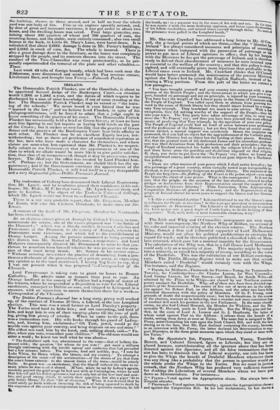The tradesmen of Galway have denounced their Liberal Represeuta- tive,
Mr Lynch, and by resolution placed their confidence iii his col- league, Mr. 'Blake, M P. for that town. Mr. Lynch hiss cut them, and gone to Leedom The object of the Trades is Univei sal Suffrage, which Mr. Lynch would not listen to.—Limerick Chronick.
There is a not very probable report, that Mr. Bridgman, Member for Ennis, will take the Chiltern Ilumireds, to make room fur Mr. E wart.
A rumour of the death of Mr. Chapman, Member for Westmeath, has been cil ciliated.
At an election- dinner given ut Armagh by Colonel Verner, to coin. mernmorate his ileum, une of the toasts proposed was'. t he battle of the Diamond ; " which W AN a bloody conflict between (;:it holies and Protestunts at the l)iainued, in the county of Armagh, wherein the Protestants were victorious, and which led to the establishment of Orange Lodges. Among the persons announced as being present at this dinner, was Mr. Spinet of Ballymore, a magistrate ; and Lord Mulgrave corisequently directed Mr. Drummond to write to that gen- tleman to ascertain trout himself whether he was present on the occa- sion of that toast being drunk. al r. Synnot in his answer says.— " Without entering into either the practice of demanding from a gen- tleman a disclosure of the proceedings of it private party, or expressing any opinion us to the toast menthmed, I hereby beg leave to say, that I was not present when it was proposed."—Correspuident tyr the Chronicle.
Lord Powerscourt is taking care to grunt no leases to Roman Catholics. He admits some as tenants from year to Year. An Orange landlord in the county of Wicklow had a couple of dozen of his tenants, whom he suspected of a disposition to vote for the Liberal candidates, coeveyed to Dublin or, cars, and shipped to Liverpool in a steamer, with an injunction to amuse themselves there for a week.— Correspondent of the Chronicle.
The Dublin Freeman's Journal has a long story, pretty well worked up, of the conduct of Thomas SP Gee, a Liberal, at the late Longford election. This man was a small farmer on Lord Dareley's property; The Tories ttied hard to btibe him ; and not succeeding, laid hold of him, and kept him in one of their cooping-places till the time of poll- ing, giving him plenty a whisky. When he came to the pull, there was a tremendous row. His wife broke through his guard of Lefroy- ists and, kissing him, exclaimed—" Oh Tom, jewel, would ye for worlds vote against your country, and bring disgrace on me and mine?" His eldest son took hint by the hand, and, sobbing aloud, said—" Fa- ther, when you vote, remember your children." The old man would not utter a word ; he knew too well what he was about-
" The freeholders' oath was administered to the voter—that of bribery dis- pensed with ; the question 'for whom do you vote? ' put amid a stillness strongly contrasting with the ten ific uproar and confusion that had prevailed
I' but a few minutes before. The response, loud and audible, was, • I vote for Luke White, for Henry white, the Queen, and toy country.' To attempt a description of the scene—of the acclamations—of the shouts of joy that from the coult-house extende. to the utmost limits of the town—would be utterly : futile. So great was oe excitement, that the Sheriff ordered the voter to to- main where he was mall it abated. M'Ciee, while he sat by Lefroy's agents, candidly praised the good usage he had met with at Carrickgiass, where he said - that himself acid his telluw•pi nutlet a had not only lute of the best beef and mut- ton, and good strong driuk, to satisfy their appetites, but also a piper 'fit to - play before Moses,' for their 'bit of diversion, When it was deemed that he : could sately go forth without incurring the risk of being squeezed to death by the eagerness of the cruwd to congratulate him on his patriotic conduct, he left
ii
the booth, an I in a moment was in the anus of his wife and sou. In the saw he was receiv rd with the most deafening applause, and borne upon the shoul,kit of his fellow-freeholders, and several tunes carried through them. No mixed the prisoners were polled in the Longford booth."


























 Previous page
Previous page